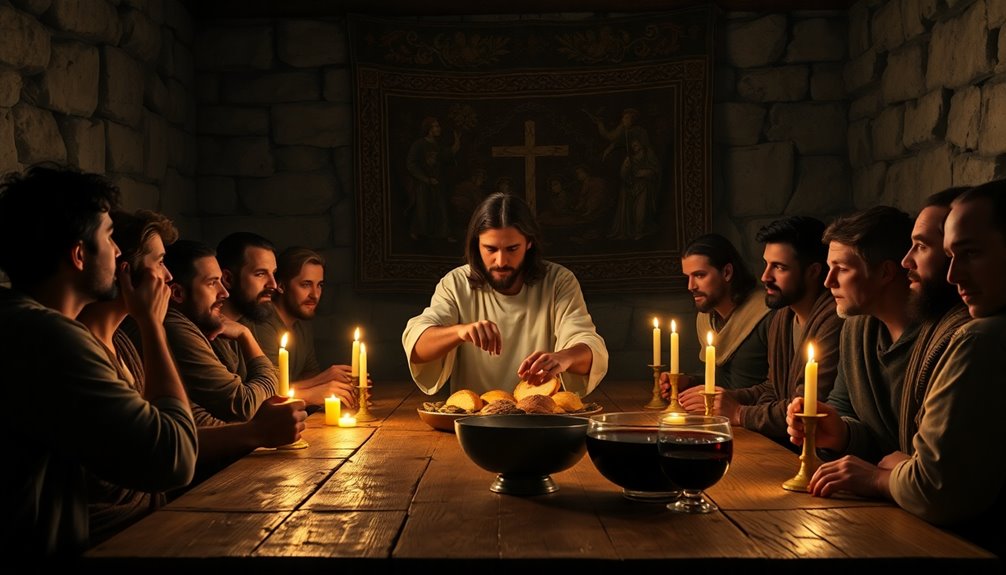Jesus shared a final meal with His disciples, a poignant event that established a new covenant before His crucifixion. This meal, filled with love and tension, marked the institution of the Eucharist, symbolizing His body and blood. He urged His followers to love one another, emphasizing unity and compassion during difficult times. By instructing them to remember this meal, He created a lasting bond among believers. To discover more about its significance, continue exploring the details of this profound moment.
As Jesus shared His final meal with His disciples during Passover, He knew it would be a moment of immense significance. This Last Supper wasn't just a traditional meal; it marked the beginning of a new covenant. The atmosphere was heavy with anticipation, knowing that the events to come would change everything. Jesus looked around the table at the men who'd followed Him, feeling a deep love for each of them, even as He prepared to confront betrayal.
During this poignant gathering, Jesus foretold the betrayal by Judas, stirring distress among the apostles. They were shocked; how could one of their own turn against Him? Then He turned to Peter, predicting his denial. These revelations weighed heavily on their hearts, yet amidst the tension, Jesus seized the opportunity to teach them about love and unity. He urged them to "love one another," knowing that His message of compassion would be crucial as they faced the trials ahead.
As the meal progressed, Jesus took bread and wine, elements that would become central to Christian worship. He broke the bread, declaring it to be His body, given for them, and lifted the cup of wine, saying it represented His blood, shed for the forgiveness of sins. This act established the sacrament of the Eucharist, a practice Christians commemorate during Holy Thursday.
When Jesus instructed His disciples to "do this in remembrance of me," He wasn't only marking His impending sacrifice but also creating a lasting ritual of connection among His followers.
This final meal was filled with profound meaning, a blend of sorrow and love. Jesus shared His last moments with His disciples, imparting wisdom and strength. He knew the trials ahead would test their faith, but He hoped they'd carry His message of love into the world. The Last Supper was more than a farewell; it was a profound declaration of purpose and connection.
As you reflect on the significance of the Last Supper, consider how Jesus transformed a simple meal into a monumental expression of faith. He set the stage for a new beginning, inviting you to embrace the values of love and unity that He embodied.
Through this final meal, Jesus left a legacy that continues to resonate with believers today, reminding you of the power of sacrifice and the call to love one another.
Frequently Asked Questions
What Was Jesus Last Meal Before He Died?
When you think about Jesus' last meal, it was a deeply significant event. He shared bread and wine, symbolizing his body and blood, which laid the groundwork for the Eucharist.
During this meal, Jesus also revealed that one of his closest followers would betray him and predicted another's denial.
This gathering wasn't just about food; it emphasized love, sacrifice, and the importance of community, making it a moment of profound meaning.
When Did Jesus Share the Last Supper?
Imagine a grand feast, with laughter echoing and aromas swirling like a dance in the air.
You'd find the Last Supper happening on the evening of April 1, AD 33, as the sun dipped below the horizon during Passover week.
It's a moment rich with meaning, as Jesus gathered His disciples in a furnished upper room in Jerusalem, setting the stage for profound teachings and a deep expression of love.
What Did Jesus Do to Each of the Disciples During the Last Supper?
During the Last Supper, Jesus took time to personally connect with each disciple.
He washed their feet, showing humility and teaching you the importance of serving others.
He blessed the bread and wine, giving them symbols of His body and blood, inviting you to partake.
He also revealed the betrayal, prompting questions among you, and predicted Peter's denial, emphasizing the complexities of loyalty and faith within your group.
What Was the Meaning of Jesus Last Meal With His Friends?
You might think a last meal would be filled with celebration, but instead, it's rich with meaning and depth.
It's a moment of profound connection and teaching, where love and sacrifice intertwine. Jesus shares bread and wine, symbolizing His essence, urging you to remember Him.
He unveils betrayal among friends, prompting reflection on loyalty. Ultimately, it's about unity and community, laying the groundwork for a faith that endures beyond His earthly presence.
Conclusion
As you reflect on that final meal, remember how it symbolizes sacrifice and unity. Just like the bread and wine shared among friends, every meal with loved ones holds the power to create lasting bonds. In moments of hardship, think of this gathering—an echo of hope and love that transcends time. Embrace the spirit of that sacred dinner, for in sharing our lives, we carry forward a message of compassion and connection, just as He intended.










